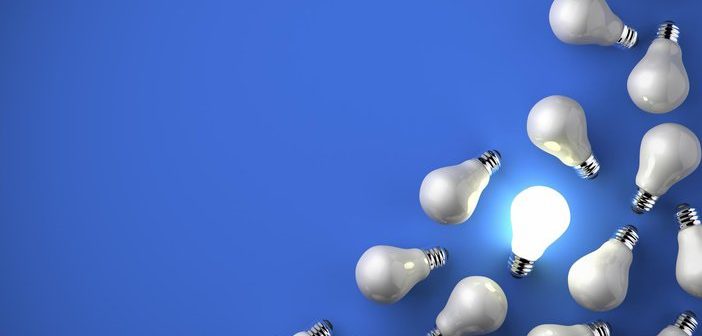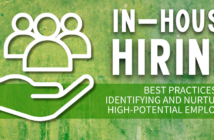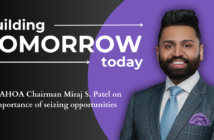by Jeff Fogel
Between 2007 and 2017, the latest period for which such data is available, diversity within the accommodations industry workforce has seen a dramatic increase. By way of example, in just the last decade, the number of accommodations workers belonging to two illustrative groups, blacks and hispanics/latinos, has more than doubled.¹
While these numbers indicate an ineluctable trend toward greater diversity in the industry, as with all raw data, there’s always a story behind the naked statistics. For instance, what is driving the trend? How pervasive are its effects on the industry, and where is the trend headed?
For answers to these, and other, questions Today’s Hotelier spoke with leaders in the industry. Here is what they had to say.
Scott Yaeger
Radius Hospitality
Radius Hospitality is a hotel management firm based in Canton, OH. They have 80 years of combined hotel experience, managing more than 50 hotels consisting of over 8,000 rooms.
Scott Yaeger, president of Radius weighed in on the diversity discussion.
“We have 700 associates that work within our properties in Ohio, Pennsylvania, New Jersey, and Connecticut. While we have no dedicated diversity program in place, I look out across our group and it is actually pretty diverse. This lends for different viewpoints. That’s a benefit when it comes to serving guests better.
“For instance, we have different nationalities. This facilitates communication with an increasingly diverse guest make-up. It’s more comfortable for a guest being served by an employee with a similar language and culture.
“Diversity in our workforce actually helps pull our team together. It makes the team stronger and more guest-focused.
“Another thing I’ve noticed. I think about the sheer number of people here. All the various types.
“As I stated, we have no specific diversity goal in place. It’s not like we feel we have to have one of these or three of those in terms of people. So we don’t say we need to hire a certain number of people with a specific ethnicity, nationality, or background as a matter of meeting some type of quota. It’s more about simply finding the right person. We just hire the best person for the job. Someone who can grow with us and become part of the organization – a member of the family. Ethnicity, race, gender, none of that matters. We hire anyone who will be right for the job. This in itself yields diversity in our make-up. We have seniors and members of the LGBT community. They’re all different but they all have one thing in common: they’re the best person for the job. It’s just about finding a person with a gift; someone that truly wants to serve guests. And not just guests, but our other associates as well. We work toward a cohesive team of long-term people. We have a very low turnover rate. And people stay for a reason.
“Let’s face it. The world is getting smaller. Diversity in a workforce is bound to be a result of this shrinking world. It simply lends itself to a greater variety of people being available in the labor pool. And it’s necessary, to better serve our guests. Different brands [hotels]attract different travelers. There are definitely different demographics. Some attract Millennials, some an older demographic – and they come from all over. With diversity among our workforce, they can relate better to us and feel more comfortable.”
Jon Munoz
Hilton
Jon Munoz is Hilton’s vice president of global diversity and inclusion. He sits on the board of nine non-profit organizations, all of which are active players in promoting and advocating for diversity. He is also founder of the National Hispanic Corporate Council’s corporate executive development program (CEDP), which is offered in partnership with Southern Methodist University’s Cox School of Business.
“We [Hilton] recruit locally,” says Munoz, adding, “There is a more diverse pool interested in working with Hilton. So we work with different organizations.”
For Munoz, there is a clear benefit to these efforts which extend all the way to upper management. “Studies show that diversity helps performance in companies. Different people bring different perspectives and viewpoints. It inspires innovation.” This is particularly true for hotels. Munoz notes, “it enables diverse guests’ needs are better met.” In fact, research has clearly pointed to a demand among customers for more diversity. “You have to avail yourself of the research. We’ve worked with Diversity Inc, Best Practices, the Conference Board. Deloitte puts out a good report. We’ve done focus groups, among different customer groups,” says Munoz, noting, “It’s about understanding a customer’s needs and matching it with workers. It’s a comprehensive approach that creates an ecosystem. We’ve worked with a number of consulting firms [such as]Diversity Inc.” This evidence is manifested in practice as well. “Inbound guests are coming from abroad, and around the world – China especially – and [guests are]increasingly Latin American.”
While Hilton is already 69 percent diverse in its workforce’s makeup, the effort continues. “It’s a journey,” says Munoz, “it goes beyond the United States; there’s a global framework that [renders]even the definition of diversity complex. It includes culture, language, and talent as well. The approach must be adapted to various markets around the world. The effort [at diversity]will continue. I don’t see an end in sight. There’s a lot of work to do. It’s evolving – changing – and growing with opportunity.”
Amy Jones
My Place
While Aberdeen, SD based My Place Hotels is viewed as a relative newcomer to the hotel business, its founders are steeped in 40 years of experience in the industry, including the wildly popular Super 8 Motels. Since February 2012, the company has expanded to 21 locations from Alaska to Pennsylvania, with 14 new hotels presently in the works.
Amy Jones, My Place diversity director, sees a good part of that success as stemming from diversity in their workplace. She views the term diversity in a broad context. “Diversity is something that is being talked about more. That’s a good thing, but diversity is a broad idea and should be clarified. It could be culture, or language, or race, or ethnicity. We are all so different. That means respect for these differences because they mean more viewpoints, experiences, and ideas. Diversity means being forward thinking. It means training and development continues to evolve and be increasingly inclusive. This benefits both our workforce and our customers as well.
“We’re a relatively new brand so it’s important that we continue thinking outside the box. Diversity helps us do this. Different backgrounds and experience in our workforce has been part of our success. It’s what has allowed us to expand, because we’re pulling different ideas from different walks of life from so many parts of the country.
“We don’t necessarily track numbers and don’t have a specific policy in place for diversity, but we work very hard to be an equal opportunity employer. And internet has changed the way we post jobs, for example. It allows a broader reach so we get a broader, more diverse response. This helps us expand [as a company]and as we create a larger footprint, it makes it easier for us to attract more diverse applicants.
“We’re not yet global but our guests are from everywhere. Diversity in our workforce definitely is beneficial. It’s beneficial [to the hotel industry]in general by the very nature of the business. And our [more diverse]employees are able to relate.
“As I work with different hotels, I’ve gotten to really know the employees, and realize just how different everybody really is. So the important thing is, you don’t have to agree with everything [they say]but you have to have respect, and to really listen.”
Source: United States Bureau of Labor Statistics, years 2007 and 2017, Accommodations.




